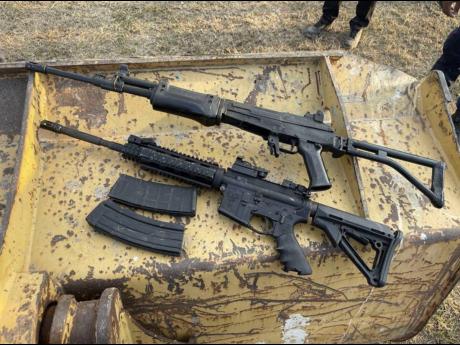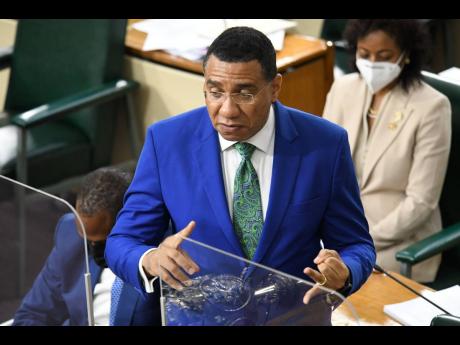CASH FOR GUNS
Only quarter of $100m fund paid out in five years of programme
Jamaicans have largely turned their backs on a $100-million fund that was created nearly five years ago to reward persons assisting law enforcement in efforts to recover illegal guns. Although a few have taken advantage of the initiative, some are...
Jamaicans have largely turned their backs on a $100-million fund that was created nearly five years ago to reward persons assisting law enforcement in efforts to recover illegal guns.
Although a few have taken advantage of the initiative, some are too afraid of the risk involved, while others are willing to go out on a limb to stem the bloodletting across the country, asking for no reward.
Since it was first announced by Prime Minister Andrew Holness in September 2017, the reward-for-guns programme has netted 224 illegal firearms and 4,788 bullets that resulted in payouts totalling $26.4 million, according to figures released by Crime Stop Jamaica (CSJ), the entity administering the initiative.
The cache of seized weapons includes 125 pistols, 31 rifles, and 21 shotguns.
Comparatively, in the first quarter of this year alone the police seized 223 illegal guns, the Jamaica Constabulary Force (JCF) disclosed last week. However, only 15 of those were based on tips received via the rewards scheme, CSJ confirmed.
For one community advocate, however, the number of weapons recovered over a near five-year period is of very little comfort, in light of Jamaica’s soaring murder rate, which has been fuelled mainly by the prevalence of illegal firearms.
“Eighty per cent of our homicides are by the gun. So, if the gun is the [weapon of] choice and our homicide rate is that high, if you can’t find 200 guns a year, you nah find no gun,” said the advocate, who did not want to be named.
Jamaica recorded just over 7,000 murders between 2017 and last year, 75 per cent of which involved the use of a gun, police statistics have shown.
Cherise Bruce-Douglas, manager of CSJ, believes the number of weapons and rounds of ammunition confiscated directly through the reward scheme is “excellent”, but acknowledged that more could have been achieved.
“We know that there are more guns out there and we know that there is more ammunition out there, so we will always encourage more people to call in and give information,” Bruce-Douglas said during a Sunday Gleaner interview.
Fifty-five guns were seized through the initiative both in 2018 and 2019 and the $6.4 million paid out each year accounted for the highest cash rewards disbursed in a calendar year, according to the CSJ figures.
Gun seizures dipped to 40 in 2020 and 36 the following year, leading to reduced payouts of $4.7 million and $4.8 million, respectively.
The measures imposed by the Government to manage the outbreak of the deadly coronavirus caused a sharp decline in tips from the public, CSJ explained.
Under the reward-for-gun project, citizens stand to earn $150,000 for tips leading to the confiscation of a rifle or sub-machine gun and $100,000 for a pistol or shotgun.
RISK OF DEATH
But according to the community advocate interviewed by The Sunday Gleaner, residents in Jamaica’s tough inner-city communities risk death and other dire consequences for tipping off authorities to illegal guns.
He cited, as an example, the pastor of a church who was warned in clear terms that his church would be “flattened” if he did not pay for a gun that was found on the premises during a police operation.
Gang members accused congregants of tipping off the police about the weapon, causing the church to shell out more than $100,000 to appease the thugs, he recounted.
The dangers to residents are compounded by the actions of rogue cops, who divulge the names of informants to gangsters, the community advocate charged.
“There are instances where people report things to the police in the morning on their way to work and by dem reach home in the evening, it is known that they are the ones who made the report,” the advocate said.
Police investigators revealed, too, that gangsters have devised their own methods of identifying residents who are talking to cops.
“When an ID parade is to be held, they have gang members patrol the community to see who the police are picking up,” said one investigator, pointing to one of the more common practices.
Cronies reporting to a police station as part of their bail condition also send back information to the gang about residents who turn up there.
The inner cities are not the only source of information for CSJ.
“We’ve seized firearms in Liguanea and we’ve seized firearms on Holborn Road,” Bruce-Douglas said, pointing to two St Andrew areas that fall in the higher-income bracket.
CIVIC DUTY
And while some informants accept the cash reward that comes with the information they provide, a majority of tipsters refuse the cash, casting themselves as concerned citizens who are trying to save their communities.
Among them is Eileen Abado*, an elderly woman who watched quietly for years as the community where she was born and raised was slowly overrun by thugs.
Abado recognised a man featured in the police’s Wanted Wednesdays social media campaign and contacted CSJ.
“She was just fed up at this time and she wanted them out of her community,” Bruce-Douglas recalled.
The suspect was later apprehended and the elderly woman wanted no reward.
For the first quarter of this year, a total of 391 tips flowed into CSJ about wanted men, armed thugs and illegal guns, marking a 97 per cent jump year-on-year, the private sector-led entity confirmed.
Five per cent of the persons whose tips this year resulted in an arrest or the confiscation of a gun did not want a reward, Bruce-Douglas disclosed.
“The few who do relay why they don’t [accept the reward] simply just want to do what is right to protect their community,” the CSJ boss said, admitting that others do it strictly for the cash reward.
She acknowledged, too, that some members of the public harbour fears about their identities being exposed, but underscored the fact that no tipster has ever been compromised in the 32-year history of Crime Stop.
*Name changed to protect identity.


